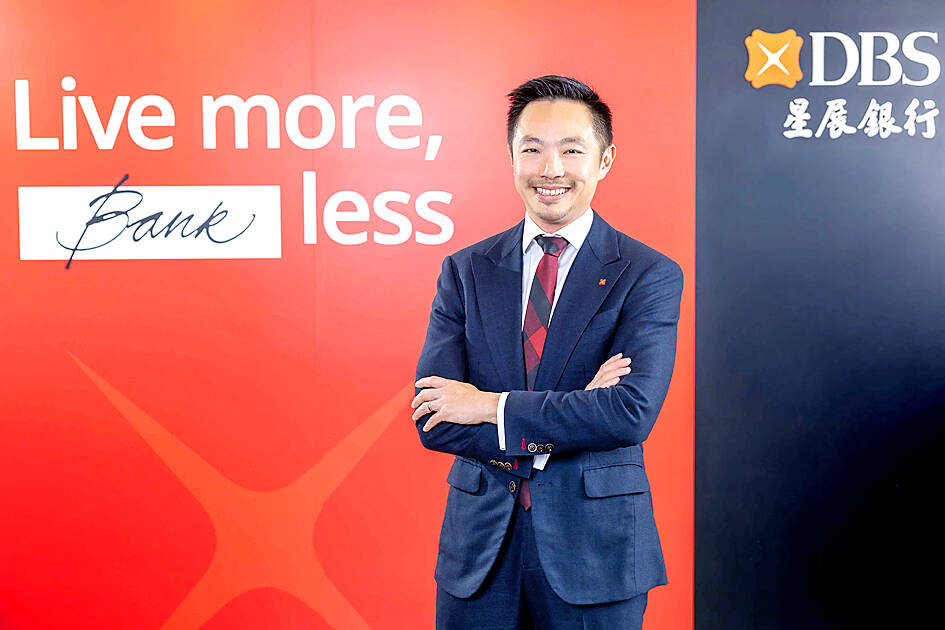Taiwan is expected to be the third-largest market for Singapore-based DBS Group Holdings Ltd, after DBS Bank Taiwan (星展台灣) completes its acquisition of Citibank Taiwan Ltd’s (台灣花旗) consumer banking business in August, a bank executive said yesterday.
Taiwan would rank after only Singapore and Hong Kong in terms of profit contribution to DBS, followed by China, India and Indonesia, DBS Taiwan general manager Ng Sier Han (黃思翰) told a media briefing in Taipei.
DBS Bank Taiwan expects to retain all 2.77 million Citibank Taiwan cardholders and help them to transition to DBS Taiwan cards over the next 12 months, Ng said.

Photo courtesy of DBS Bank Taiwan via CNA
The bank will start sending new ATM cards to Citibank clients two or three weeks before the completion of the acquisition on Aug. 12, he said.
Citibank Taiwan credit cardholders can continue to use the plastic cards, and DBS Taiwan will begin sending them new credit cards later this year or early next year, he said.
Ng reiterated that DBS Taiwan would provide the same, if not better, rewards and partnership to the 2.77 million Citibank cardholders, and they can continue to collect and redeem rewards after Aug. 12.
“Each Taiwanese owns six credit cards on average, and the competition in the local credit card market is very intense,” Ng said.
The acquisition would expand DBS Taiwan’s client base, making it more economically efficient, he said.
The bank plans to launch a new credit card to maintain its momentum, Ng said.
With a larger client base, DBS Taiwan would enhance digital banking services, such as introducing a chat robot, to address questions or complaints by Citibank customers, he said.
The customer boost should drive up DBS Taiwan’s income from consumer banking, helping it to catch up with its corporate banking division by the end of this year, Ng said.
At present, DBS Taiwan derives 20 percent of its revenue from consumer banking and 80 percent for corporate banking.
DBS Taiwan does not rule out pursuing more merger and acquisition opportunities in Taiwan if the timing and price is right, as the bank has no securities or securities investment trust arm, Ng said.

Power supply and electronic components maker Delta Electronics Inc (台達電) yesterday said second-quarter revenue is expected to surpass the first quarter, which rose 30 percent year-on-year to NT$118.92 billion (US$3.71 billion). Revenue this quarter is likely to grow, as US clients have front-loaded orders ahead of US President Donald Trump’s planned tariffs on Taiwanese goods, Delta chairman Ping Cheng (鄭平) said at an earnings conference in Taipei, referring to the 90-day pause in tariff implementation Trump announced on April 9. While situations in the third and fourth quarters remain unclear, “We will not halt our long-term deployments and do not plan to

‘SHORT TERM’: The local currency would likely remain strong in the near term, driven by anticipated US trade pressure, capital inflows and expectations of a US Fed rate cut The US dollar is expected to fall below NT$30 in the near term, as traders anticipate increased pressure from Washington for Taiwan to allow the New Taiwan dollar to appreciate, Cathay United Bank (國泰世華銀行) chief economist Lin Chi-chao (林啟超) said. Following a sharp drop in the greenback against the NT dollar on Friday, Lin told the Central News Agency that the local currency is likely to remain strong in the short term, driven in part by market psychology surrounding anticipated US policy pressure. On Friday, the US dollar fell NT$0.953, or 3.07 percent, closing at NT$31.064 — its lowest level since Jan.

The US dollar was trading at NT$29.7 at 10am today on the Taipei Foreign Exchange, as the New Taiwan dollar gained NT$1.364 from the previous close last week. The NT dollar continued to rise today, after surging 3.07 percent on Friday. After opening at NT$30.91, the NT dollar gained more than NT$1 in just 15 minutes, briefly passing the NT$30 mark. Before the US Department of the Treasury's semi-annual currency report came out, expectations that the NT dollar would keep rising were already building. The NT dollar on Friday closed at NT$31.064, up by NT$0.953 — a 3.07 percent single-day gain. Today,

The New Taiwan dollar and Taiwanese stocks surged on signs that trade tensions between the world’s top two economies might start easing and as US tech earnings boosted the outlook of the nation’s semiconductor exports. The NT dollar strengthened as much as 3.8 percent versus the US dollar to 30.815, the biggest intraday gain since January 2011, closing at NT$31.064. The benchmark TAIEX jumped 2.73 percent to outperform the region’s equity gauges. Outlook for global trade improved after China said it is assessing possible trade talks with the US, providing a boost for the nation’s currency and shares. As the NT dollar